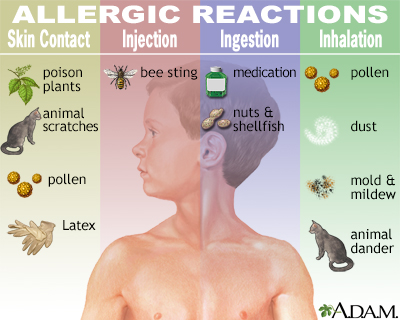
Allergy specialist
Introduction
The purpose of this tool is to help you decide whether or not to see an allergy specialist. When making a decision like this, you must balance:
- The reasons for seeing the specialist
- Whether there are alternatives that may be more appropriate
- Cost
This tool is not a substitute for professional medical care and advice. Ask your regular doctor to help you decide whether it is worth seeing a specialist. There is usually no exact "right" or "wrong" answer.
Your doctor may make certain recommendations to you. However, the final decision about whether to see a specialist rests with you.
What does this specialist do?
Just about any substance that you inhale or swallow, or that touches your skin, can cause allergies. Your body's immune system is designed to attack harmful substances like bacteria and viruses. But with allergies, your body launches an assault on substances (allergens) that are basically harmless -- such as pollen, mold, dust mites, pet saliva and dander, and even medications and insect sting venom.

Allergies not only cause a range of annoying symptoms such as sneezing and itchy eyes, they also can aggravate or trigger other conditions such as asthma, sinusitis, and ear infections. Allergies are extremely common. About 50 million Americans suffer from allergies, leading to a lot of missed work and school days each year.
Many people initially self-treat their allergies with over-the-counter drugs. But if your allergy symptoms do not improve, or you have unpleasant side effects from these medicines, you may need to see a health care provider. Your primary care doctor can prescribe most allergy drugs for you.
Many people with bad allergies wonder about seeing an "allergist." An allergist diagnoses, treats, and manages allergy-related conditions, like allergic rhinitis and asthma. To become an allergist or immunologist, a doctor needs at least 2 - 3 years of specialized study in asthma, allergy, and immunology after their medical training. Those who are ABAI-certified passed the American Board of Allergy and Immunology's certification examination.
Key points
- Your allergist can help determine if the symptoms you are experiencing are due to allergies or not.
- A common reason to see an allergist is to get tested for allergies. This can include blood tests and skin testing. The goal is to help you know what is causing your allergies, so you can take steps to address them.
- Your allergist can also help manage medication side effects, and offer advice on treatment options, including immunotherapy (allergy shots).
- If your allergies are due to allergens in your environment, your allergist can help identify those factors and minimize your exposure to them.
- Anyone who has had a severe allergic reaction to food, medicine, or stings should see an allergist.
How much time this decision tool will take
5 - 10 minutes
What this tool will provide
- A personalized list of factors for you to weigh
- Questions to ask your doctor
- Alternatives to seeing a specialist
- Recommended reading
|
Review Date:
9/12/2010 Reviewed By: Linda J. Vorvick, MD, Medical Director, MEDEX Northwest Division of Physician Assistant Studies, University of Washington, School of Medicine. Also reviewed by David Zieve, MD, MHA, Medical Director, A.D.A.M., Inc. |
- Bahls C. In the clinic. Allergic rhinitis. Ann Intern Med. 2007 Apr 3;146(7):ITC4-1-ITC4-16.
- Calderon MA, Alves B, Jacobson M, Hurwitz B, Sheikh A, Durham S. Allergen injection immunotherapy for seasonal allergic rhinitis. Cochrane Database Syst Rev. 2007 Jan 24;(1):CD001936.
- Joint Task Force on Practice Parameters. Allergen immunotherapy: a practice parameter. American Academy of Allergy, Asthma and Immunology. Annals of Allergy, Asthma & Immunology. 2003 Jan;90(1 Suppl 1):1-40.
- Saleh HA, Durham SR. Perennial rhinitis. BMJ. 2007 Sep 8;335(7618):502-7.



